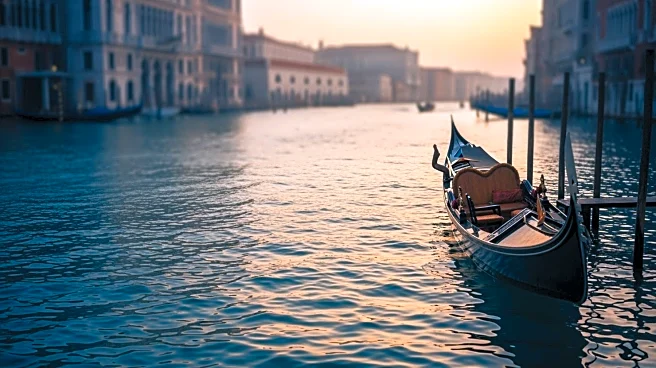What's Happening?
Greta Thunberg has been banned from Venice after participating in a protest organized by Extinction Rebellion, where activists dyed the city's canals green. The protest was part of a larger demonstration across Italy, targeting ten sites to highlight
the urgency of climate change. The action coincided with the COP30 summit in Brazil, where activists expressed dissatisfaction with the lack of commitments to limit fossil fuel use. Extinction Rebellion claims the dye used is environmentally harmless and symbolizes the severe impacts of climate collapse. The protest involved demonstrators dressed in red, with veils covering their faces, walking through tourist areas. This event follows Thunberg's recent attempt to deliver aid to Gaza, which resulted in her detention for five days.
Why It's Important?
The ban on Greta Thunberg from Venice underscores the tension between climate activists and governmental authorities. The protest highlights the ongoing struggle to achieve meaningful international agreements on climate change, particularly regarding fossil fuel usage. The actions of Extinction Rebellion and Thunberg draw attention to the perceived inadequacies of the COP30 summit, which many activists believe failed to address critical environmental issues. This incident reflects broader societal debates on environmental policy and the role of civil disobedience in advocating for change. The protest and subsequent ban may influence public opinion and policy discussions on climate action, potentially affecting future international negotiations.
What's Next?
The ban on Thunberg may lead to increased scrutiny of Venice's policies towards environmental activism. Extinction Rebellion is likely to continue its campaign for stronger climate action, potentially organizing further protests. The outcome of the COP30 summit may prompt additional demonstrations worldwide, as activists push for more ambitious commitments from governments. The incident may also spark discussions within the European Union and other international bodies about balancing security concerns with the right to protest. Stakeholders, including political leaders and environmental groups, may respond with statements or actions addressing the issues raised by the protest.
Beyond the Headlines
The protest in Venice raises questions about the effectiveness of direct action in influencing climate policy. It highlights the ethical considerations of using public spaces for activism and the potential impact on local communities and tourism. The ban on Thunberg may also reflect broader cultural and political dynamics in Italy, where environmental issues intersect with national and international politics. The event could contribute to a long-term shift in public awareness and engagement with climate change, encouraging more individuals to participate in environmental advocacy.

















